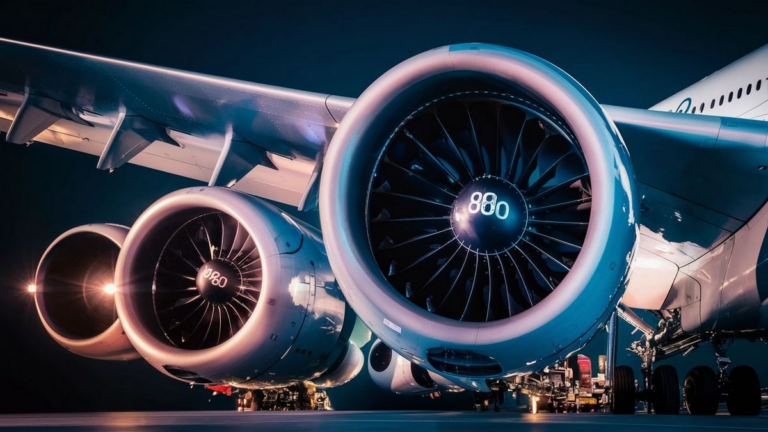The Airbus A380, often referred to as the “superjumbo,” is an iconic double-deck, wide-body, long-range airliner that has captivated aviation enthusiasts since its introduction. One of the critical aspects influencing the performance and capabilities of this behemoth is the choice of engines.
When it comes to powering the Airbus A380, airlines have had the privilege of selecting from a range of engine options offered by prominent aerospace manufacturers. These engine choices play a pivotal role in determining factors such as fuel efficiency, range, and overall operational performance of the A380.
Rolls-Royce Trent 900
One of the notable engine choices for the Airbus A380 is the Rolls-Royce Trent 900. This engine, developed by the renowned British engineering company, is known for its advanced technology and efficiency. The Trent 900 provides operators with a balance of power and fuel economy, contributing to the A380’s reputation as a cost-effective and environmentally friendly option.
Engine Alliance GP7200
Another significant contender in the realm of A380 engine choices is the Engine Alliance GP7200. A collaborative effort between General Electric and Pratt & Whitney, the GP7200 is a high-bypass turbofan engine designed to meet the demands of long-haul flights. Its innovative design and performance characteristics make it a popular choice for airlines seeking reliability and optimal fuel consumption.
Comparative Analysis
When considering Airbus A380 engine choices, airlines often engage in a comprehensive comparative analysis to determine the best fit for their operational needs. Factors such as fuel efficiency, maintenance costs, and overall performance are meticulously evaluated to make an informed decision.
| Engine Model | Key Features |
|---|---|
| Rolls-Royce Trent 900 | Advanced technology, fuel efficiency, environmental sustainability |
| Engine Alliance GP7200 | Collaborative design, reliability, optimal fuel consumption |
Operator Preferences
The preference for a particular engine type often varies among Airbus A380 operators. Airlines prioritize different aspects based on their operational strategies and priorities. Some may prioritize fuel efficiency, while others may emphasize long-term maintenance considerations.
Future Trends
As technology continues to evolve, the landscape of Airbus A380 engine choices may witness new entrants and advancements. Manufacturers are likely to explore innovations that enhance fuel efficiency, reduce environmental impact, and provide airlines with a competitive edge in the ever-evolving aviation industry.
Choosing the right engine for the Airbus A380 is a crucial decision for airlines, impacting various aspects of their operations. The Rolls-Royce Trent 900 and Engine Alliance GP7200 are two formidable choices, each offering unique advantages. As the aviation industry progresses, the continued exploration of cutting-edge technologies ensures that the A380 remains a symbol of innovation and excellence in long-haul air travel.
Fuel Efficiency and Environmental Impact
While the Rolls-Royce Trent 900 and Engine Alliance GP7200 are renowned for their fuel efficiency, the emphasis on environmental sustainability is becoming increasingly crucial in engine choices for the Airbus A380. Airlines are not only evaluating economic factors but are also considering the ecological footprint of their operations. Future engine developments may focus on reducing emissions and enhancing overall environmental sustainability.
Frequently Asked Questions
- Q1: Are there any new engine options for the Airbus A380?
- Q2: How do operators assess the long-term maintenance considerations of A380 engines?
- Q3: Is there a shift in operator preferences over time regarding A380 engine choices?
A1: As of the latest information available, there haven’t been significant new engine options introduced for the Airbus A380. However, ongoing advancements in aerospace technology may lead to future developments.
A2: Airlines often conduct in-depth assessments of maintenance costs, reliability, and durability when selecting A380 engines. Long-term maintenance considerations play a pivotal role in the decision-making process.
A3: Operator preferences can evolve based on industry trends and technological advancements. Some airlines may shift priorities over time, emphasizing different aspects such as fuel efficiency, environmental impact, or long-term maintenance.
Technological Advancements in Materials
Beyond the performance characteristics of the engines, future trends in Airbus A380 engine choices may involve advancements in materials. Innovations in composite materials, for instance, could contribute to reduced engine weight and improved overall efficiency, influencing the operational dynamics of the A380.
| Material Type | Potential Benefits |
|---|---|
| Composite | Reduced weight, improved fuel efficiency |
| Advanced Alloys | Enhanced durability, heat resistance |
Global Regulatory Impact
Global aviation regulations and emission standards have a significant impact on the development and selection of engines for large aircraft like the Airbus A380. Future trends may see manufacturers aligning their innovations with evolving international standards, ensuring compliance and sustainability in the competitive airline industry.
See also:






